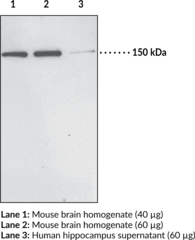Description
Cayman’s PHLPP1 Polyclonal Antibody detects the carboxy-terminal amino acids within the PDZ-binding domain of both the PHLPP1 α and β isoforms. PHLPP2 shares partial identity with the domains of PHLPP1 however it has a unique PDZ-binding domain sequence. Protein kinase B/Akt is critical in regulating cell growth and death. Activation of a serine residue (Ser473) in a C-terminal hydrophobic motif of Akt is known to be linked to some of the most common human cancers. PHLPP1 and PHLPP2 dephosphorylate the hydrophobic motif of Akt and thus reduce Akt activity, resulting in a increase in the number of apoptotic cells.{13717} PHLPP1 levels are markedly reduced in several colon cancer and glioblastoma cell lines that have elevated Akt phosphorylation. Injection of a human glioblastoma cell line overexpressing PHLPP1 into mice reduced tumor size by nearly 70% compared with control animals. mRNA of PHLPP1 is ubiquitously expressed, with highest levels found in brain.{13717} Cayman’s PHLPP Polyclonal Antibody detects the enzyme at around 150 kDa (α isoform) and 200 kDa (β isoform) by western blot from various cell lines (THP-1) and tissues such as brain.
Synonyms: hSCOP|KIAA0606|PHLPP1|Pleckstrin Homology Domain-containing Family E Member 1|PLEKHE1|Suprachiasmatic Nucleus Circadian Oscillatory Protein
Immunogen: Synthetic peptide from the C-terminal region of human PHLPP1 (β isoform)
Formulation: Peptide affinity-purified antibody lyophilized from 500 μl
Isotype:
Applications: ICC, IHC (paraffin-embedded tissue), and WB
Origin: Animal/Rabbit
Stability: 365 days
Application|Immunocytochemistry||Application|Immunohistochemistry||Application|Western Blot||Product Type|Antibodies|Polyclonal Antibodies||Research Area|Cancer|Cell Signaling



